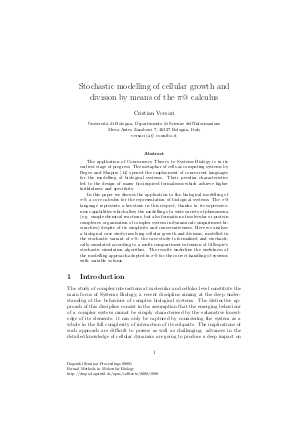Stochastic modelling of cellular growth and division by means of the pi@ calculus
Author Cristian Versari
-
Part of:
Volume:
Dagstuhl Seminar Proceedings, Volume 9091
Part of: Series: Dagstuhl Seminar Proceedings (DagSemProc) - License:
 Creative Commons Attribution 4.0 International license
Creative Commons Attribution 4.0 International license
- Publication Date: 2009-05-05
File

PDF
DagSemProc.09091.7.pdf
- Filesize: 220 kB
- 15 pages
Document Identifiers
Subject Classification
Keywords
- Process algebra
- pi-calculus
- simulation
- stochastic
Metrics
- Access Statistics
-
Total Accesses (updated on a weekly basis)
0Document
0Metadata
Abstract
The application of Concurrency Theory to Systems Biology is in its earliest stage of progress. The metaphor of cells as computing systems by Regev and Shapiro opened the employment of concurrent languages for the modelling of biological systems. Their peculiar characteristics led to the design of many bio-inspired formalisms which achieve higher faithfulness and specificity. In this paper we discuss the application to the biological modelling of pi@, a core calculus for the representation of biological systems. The pi@ language represents a keystone in this respect, thanks to its expressiveness capabilities which allow the modelling of a wide variety of phenomena (e.g. simple chemical reactions, but also formation of molecular or protein complexes, organisation of complex system in dynamical compartment hierarchies) despite of its simplicity and conservativeness. Here we analyse a biological case study involving cellular growth and division, modelled in the stochastic variant of pi@: the case study is formalised and stochastically simulated according to a multi-compartment extension of Gillespie's stochastic simulation algorithm. The results underline the usefulness of the modelling approach adopted in pi@ for the correct handling of systems with variable volume.
Cite As Get BibTex
Cristian Versari. Stochastic modelling of cellular growth and division by means of the pi@ calculus. In Formal Methods in Molecular Biology. Dagstuhl Seminar Proceedings, Volume 9091, pp. 1-15, Schloss Dagstuhl – Leibniz-Zentrum für Informatik (2009)
https://doi.org/10.4230/DagSemProc.09091.7
BibTex
@InProceedings{versari:DagSemProc.09091.7,
author = {Versari, Cristian},
title = {{Stochastic modelling of cellular growth and division by means of the pi@ calculus}},
booktitle = {Formal Methods in Molecular Biology},
pages = {1--15},
series = {Dagstuhl Seminar Proceedings (DagSemProc)},
ISSN = {1862-4405},
year = {2009},
volume = {9091},
editor = {Rainer Breitling and David Roger Gilbert and Monika Heiner and Corrado Priami},
publisher = {Schloss Dagstuhl -- Leibniz-Zentrum f{\"u}r Informatik},
address = {Dagstuhl, Germany},
URL = {https://drops.dagstuhl.de/entities/document/10.4230/DagSemProc.09091.7},
URN = {urn:nbn:de:0030-drops-19907},
doi = {10.4230/DagSemProc.09091.7},
annote = {Keywords: Process algebra, pi-calculus, simulation, stochastic}
}
